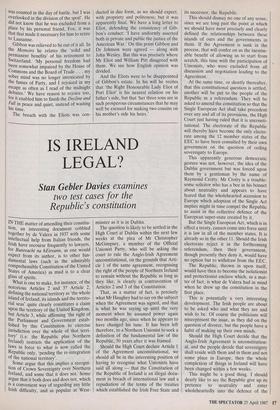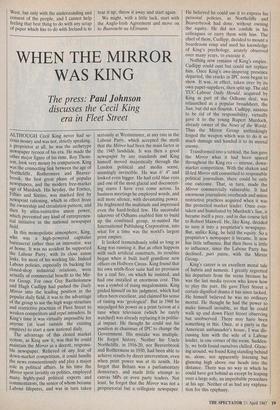IS IRELAND LEGAL?
Stan Gebler Davies examines
two test cases for the
Republic's constitution IN THE matter of amending their constitu- tion, an interesting document cobbled together by de Valera in 1937 with some intellectual help from Italian friends, the Irish have recourse frequently to lawyers, for Bunreacht na hEireann, as one would expect from its author, is to other fun- damental laws (such as the admirably comprehensible Constitution of the United States of America) as mud is to a clear glass of spirits. What is one to make, for instance, of the notorious Articles 2 and 3? Article 2, defining the national territory as 'the whole island of Ireland, its islands and the territo- rial seas' quite clearly constitutes a claim upon the territory of the United Kingdom, but Article 3, while affirming 'the right of the Parliament and Government estab- lished by this Constitution to exercise jurisdiction over the whole of that terri- tory' (i.e. the Republic plus Northern Ireland) restricts the application of the laws in force to what is now called the Republic only, 'pending the re-integration of the national territory'. Some argue that this implies a recogni- tion of Crown Sovereignty over Northern Ireland, and some that it does not. Some argue that it both does and does not, which is .a convenient way of regarding any little Irish difficulty, and as popular at West- minster as it is in Dublin.
The question is likely to be settled in the High Court at Dublin within the next few weeks at the plea of Mr Christopher McGimpsey, a member of the Official Unionist Party, who will be asking the court to rule the Anglo-Irish Agreement unconstitutional, on the grounds that Arti- cle 1 of the same agreement, recognising the right of the people of Northern Ireland to remain without the Republic as long as they like, is clearly in contravention of Articles 2 and 3 of the Constitution.
That, as a matter of fact, is precisely what Mr Haughey had to say on the subject when the Agreement was signed, and that is what he was saying up until the very moment when he assumed power again two months ago, since when he appears to have changed his tune. It has been left therefore, to a Northern Unionist to seek a definition of the fundamental law of the Republic, 50 years after it was framed.
Should the High Court declare Article 1 of the Agreement unconstitutional, we should all be in the interesting position of having to recognise what Unionists have said all along — that the Constitution of the Republic of Ireland is an illegal docu- ment in breach of international law and a repudiation of the terms of the treaties which established the Irish Free State and its successor, the Republic.
This should dismay no one of any sense, since we are long past the point at which we should have most precisely and clearly defined the relationships between these islands of ours and the governments in them. If the Agreement is sunk in the process, that will confer on us the inestim- able benefit of allowing us to start from scratch, this time with the participation of Unionists, who were excluded from all discussion and negotiation leading to the Agreement.
At the same time, or shortly thereafter, that this constitutional question is settled, another will be put to the people of the Republic in a referendum. They will be asked to amend the constitution so that the Single European Act shall take precedent over any and all of its provisions, the High Court just having ruled that it is unconsti- tutional. The electorate of the Republic will thereby have become the only electo- rate among the 12 member states of the EEC to have been consulted by their own government on the question of ceding sovereignty to Europe.
This apparently generous democratic gesture was not, however, the idea of the Dublin government but was forced upon them by a gentleman by the name of Raymond Crotty. Mr Crotty is a trouble- some solicitor who has a bee in his bonnet about neutrality and appears to have feared that the wholehearted accession to Europe which adoption of the Single Act implies might in time compel the Republic to assist in the collective defence of the European super-state created by it.
But the Single European Act, which is in effect a treaty, cannot come into force until it is law in all of the member states. It is already so in the other 11. Should the Irish electorate reject it in the forthcoming referendum, then their government, though presently they deny it, would have no option but to withdraw from the EEC.
The Republic, thrown in upon itself, would have then to become the isolationist and protectionist enclave which, as a mat- ter of fact, is what de Valera had in mind when he drew up the constitution in the first place.
This is potentially a very interesting development. The Irish people are about to be asked who and what they are and wish to be. Of course the politicians will misrepresent the issue, as they did on the question of divorce, but the people have a habit of making up their own minds.
Should the High Court decide that the Anglo-Irish Agreement is unconstitution- al, and the people decide that sovereignty shall reside with them and in them and not some place in Europe, then the whole complexion of things in Ireland will have been changed within a few weeks.
This might be a good thing. I should dearly like to see the Republic give up its pretence to neutrality and enter wholeheartedly into the defence of the West, but only with the understanding and consent of the people, and I cannot help feeling that best thing to do with any scrap of paper which has to do with Ireland is to tear it up, throw it away and start again. We might, with a little luck, start with the Anglo-Irish Agreement and move on to Bunreacht na hEireann.



































































 Previous page
Previous page